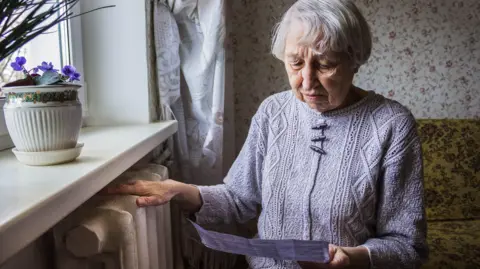A recent report by Age UK London reveals a concerning trend among older residents of the capital, highlighting that financial worries are causing significant stress and, in many cases, sleepless nights. As economic conditions deteriorate and living costs rise, a growing number of individuals over the age of 50 are struggling to maintain their quality of life. This report sheds light on the harsh realities faced by older Londoners, many of whom report feelings of anxiety and isolation due to their financial situations.
The research conducted by the charity reveals that many older people in London are contending with severe economic pressures. This includes the rising costs of housing and maintenance, alongside challenges faced in navigating the increasingly digital world, which often excludes those who are not tech-savvy. The study highlights a stark statistic: 38% of older respondents expressed concerns over the potential of accumulating energy debt due to unpaid bills, reflecting a broader trend of financial insecurity that plagues this demographic.
To gain insights into these issues, Age UK London engaged with individuals over 50 years old, allowing them to share their experiences and challenges. Among the findings, the report pointed out that many older Londoners are unaware of available strategies for reducing energy consumption. This knowledge gap indicates a significant need for education regarding energy-saving measures, especially during this period of high energy costs.
A particularly heart-wrenching aspect of the report involves the choice between heating and eating—a common dilemma faced by many. Indeed, over 25% of older respondents stated their homes are colder than they would prefer “all of the time” or “most of the time.” Also alarming was the revelation that 36% of older Londoners feel less financially secure now than they did at the start of the year, attributing this decline in financial stability partly to the government’s decision to restrict Winter Fuel Payments to those on Pension Credit or specific other benefits, further limiting those in need.
As the report narrates, individuals like Margaret, a retired Londoner, have sacrificed personal belongings, such as jewelry, in order to cover their living expenses. She recounted selling her engagement ring for a mere £127, which, although helpful temporarily, left her worrying about how to afford food for the week—a severe indicator of financial duress.
Further compounding this issue is the struggle alumni face in finding affordable food options. Nearly half of respondents reported difficulties in “shopping around” for better prices, leading many to postpone necessary home repairs and maintenance. Many individuals expressed that their feelings of isolation are exacerbated by financial constraints that prevent them from participating in social activities, which are vital for mental well-being.
John McGeachy, campaigns manager from Age UK London, shared his dismay over the stories collected during the research, revealing that some individuals felt compelled to sell household items just to meet their basic needs. He highlighted the toll taken on older people when they avoid social outings, not only due to costs but also due to feeling shame about their financial situations. He emphasized the importance of social interaction for maintaining good health and quality of life.
In response to these urgent needs, Age UK London is advocating for the government to streamline benefit applications, enhance rent protections, and improve mental health support. These changes, the charity argues, would significantly aid older Londoners in navigating financial challenges while maintaining their dignity.
As the situation evolves, it is imperative for local authorities and communities to step up and provide the necessary support for older residents in London to help them endure these trying times and emerge more secure in their financial futures. Efforts to address these pressing issues must be prioritized to ensure that no one is left behind as we work toward a more supportive framework for our elderly citizens.



